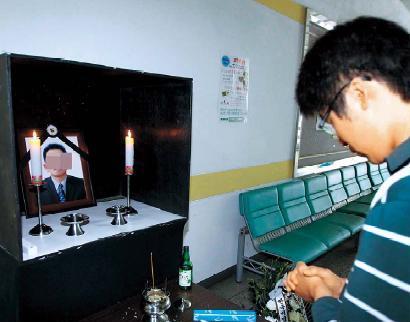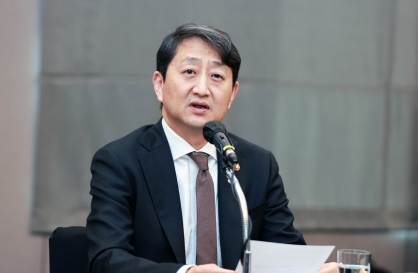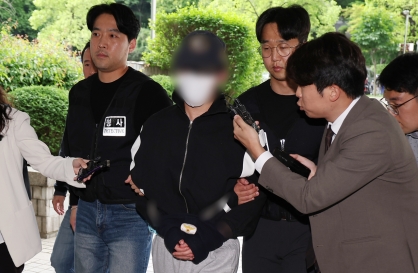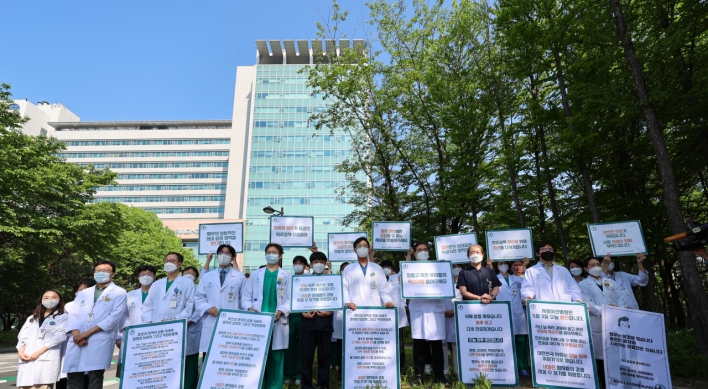Following the recent suicide of a part-time university lecturer, the public’s eye is drawn to the gloomy reality of the highly educated teachers’ group.
The Sungkyunkwan University branch of the Korean Irregular Professors’ Union volunteered last Monday to have a five percent cut on their wages.
“The gist of our decision was not only to cut the wages of the already poorly paid part-time lecturers but to demand the school reduce the ever-soaring tuition fees,” said an official of the union.
“The recent death of that lecturer in Gwangju has driven us to take such decisive action.”
The Sungkyunkwan University branch of the Korean Irregular Professors’ Union volunteered last Monday to have a five percent cut on their wages.
“The gist of our decision was not only to cut the wages of the already poorly paid part-time lecturers but to demand the school reduce the ever-soaring tuition fees,” said an official of the union.
“The recent death of that lecturer in Gwangju has driven us to take such decisive action.”

Unionized irregular professors expect that this self-sacrificing act will draw the public’s attention to their underprivileged reality and induce universities to compromise with lowered tuition fees.
Seo Jeong-min, a 45-year-old lecturer at Chosun University in Gwangju, committed suicide in his house on May 25 by poisoning himself with briquette gas, according to the Gwangju police.
He left a five-page suicide note, hinting at his desperation as he once again failed to be selected as a regular professor in a private university in Gyeonggi Province.
“I request for an official investigation on the reality of part-time lecturers,” Seo said in his note.
“Korean society shall sink into deeper moral corruption unless necessary measures are taken.”
He claimed that senior professors only took advantage of his students, including graduates-turned-lecturers such as himself.
“I have ghostwritten 54 papers for my mentor professor or for one of his students, none of which I was given proper credit for,” he revealed in his note.
The late instructor also blamed the corrupt practices of universities taking bribes in return of offering a professing job. In his note, he specifically addressed his message to President Lee Myung-bak, asking him to step in and set things right.
“It usually takes 150 million ($121,261) to 300 million won in order to win a regular professor position,” Seo wrote.
“I, too, have been asked twice in the past to pay such bribes in exchange of the teaching position which I applied for.”
The university in Gyeonggi Province, which he recently failed to join, also asked for 100 million won in kickbacks, he claimed.
The Gwangju police have launched an official investigation on the case, focusing on the bribery allegations in the mentioned schools, said officials last week.
Seo’s shocking revelations, however, were open secrets made public, according to his fellow lecturers.
“It is hard for to accept the poor conditions offered to a part-time lecturer, especially when one has spent long years, a large amount of money and much effort to win a master’s or doctor’s degree,” said a corporate worker surnamed Choi.
The 32-year-old Choi went to study in the United States for his doctor’s degree in mechanical engineering in order to become a professor, but found that part-time teaching jobs were the best he could get.
“The exploitative and poorly paid part-time jobs are, surprisingly, much yearned for and therefore difficult to get,” Choi said.
“This is why I gave up on my original plan and joined a conglomerate as a researcher.”
The annual income of an average part-time lecturer was 9.99 million won, only 24 percent of that of a full-time professor, according to Rep. Hwang Woo-yea of the parliamentary education committee in last year’s audit.
With various taxes deducted, the actual money amounted to a mere 4.87 million won, which is about an eighth of a full-time professor’s wage.
Irregular lecturers are rarely given insurance benefits.
A recent Education Ministry survey also showed that part-time professors, who take up 62 percent of the total teaching staff and are in charge of 55 percent of the university classes, lived on 10-20 percent of a regular professor’s wage.
The irregular teachers also suffered from employment instability as 88.3 percent were temporarily hired for a maximum of six months.
“It is no surprise that the cornered lecturers are up to anything to become a regular professor and break out of the vicious circle,” said Choi.
“Paying bribes -- with borrowed money, of course -- or ghostwriting for influential professors may be prices they are more than willing to pay, considering their very painful reality.”
The Education Ministry has recently vowed to prepare measures by the end of this month on the treatment of part-time university lecturers, but expects opposition from universities and budget limitations.
“The present situation requires a fundamental solution, such as promoting the legal status of part-time lecturers,” said an official of the KIPU.
“Stopgap policies will not be sufficient to safeguard their rights.”
By Bae Hyun-jung (tellme@heraldcorp.com)
Seo Jeong-min, a 45-year-old lecturer at Chosun University in Gwangju, committed suicide in his house on May 25 by poisoning himself with briquette gas, according to the Gwangju police.
He left a five-page suicide note, hinting at his desperation as he once again failed to be selected as a regular professor in a private university in Gyeonggi Province.
“I request for an official investigation on the reality of part-time lecturers,” Seo said in his note.
“Korean society shall sink into deeper moral corruption unless necessary measures are taken.”
He claimed that senior professors only took advantage of his students, including graduates-turned-lecturers such as himself.
“I have ghostwritten 54 papers for my mentor professor or for one of his students, none of which I was given proper credit for,” he revealed in his note.
The late instructor also blamed the corrupt practices of universities taking bribes in return of offering a professing job. In his note, he specifically addressed his message to President Lee Myung-bak, asking him to step in and set things right.
“It usually takes 150 million ($121,261) to 300 million won in order to win a regular professor position,” Seo wrote.
“I, too, have been asked twice in the past to pay such bribes in exchange of the teaching position which I applied for.”
The university in Gyeonggi Province, which he recently failed to join, also asked for 100 million won in kickbacks, he claimed.
The Gwangju police have launched an official investigation on the case, focusing on the bribery allegations in the mentioned schools, said officials last week.
Seo’s shocking revelations, however, were open secrets made public, according to his fellow lecturers.
“It is hard for to accept the poor conditions offered to a part-time lecturer, especially when one has spent long years, a large amount of money and much effort to win a master’s or doctor’s degree,” said a corporate worker surnamed Choi.
The 32-year-old Choi went to study in the United States for his doctor’s degree in mechanical engineering in order to become a professor, but found that part-time teaching jobs were the best he could get.
“The exploitative and poorly paid part-time jobs are, surprisingly, much yearned for and therefore difficult to get,” Choi said.
“This is why I gave up on my original plan and joined a conglomerate as a researcher.”
The annual income of an average part-time lecturer was 9.99 million won, only 24 percent of that of a full-time professor, according to Rep. Hwang Woo-yea of the parliamentary education committee in last year’s audit.
With various taxes deducted, the actual money amounted to a mere 4.87 million won, which is about an eighth of a full-time professor’s wage.
Irregular lecturers are rarely given insurance benefits.
A recent Education Ministry survey also showed that part-time professors, who take up 62 percent of the total teaching staff and are in charge of 55 percent of the university classes, lived on 10-20 percent of a regular professor’s wage.
The irregular teachers also suffered from employment instability as 88.3 percent were temporarily hired for a maximum of six months.
“It is no surprise that the cornered lecturers are up to anything to become a regular professor and break out of the vicious circle,” said Choi.
“Paying bribes -- with borrowed money, of course -- or ghostwriting for influential professors may be prices they are more than willing to pay, considering their very painful reality.”
The Education Ministry has recently vowed to prepare measures by the end of this month on the treatment of part-time university lecturers, but expects opposition from universities and budget limitations.
“The present situation requires a fundamental solution, such as promoting the legal status of part-time lecturers,” said an official of the KIPU.
“Stopgap policies will not be sufficient to safeguard their rights.”
By Bae Hyun-jung (tellme@heraldcorp.com)









![[K-pop’s dilemma] Time, profit pressures work against originality](http://res.heraldm.com/phpwas/restmb_idxmake.php?idx=644&simg=/content/image/2024/05/08/20240508050705_0.jpg&u=20240508171126)
![[K-pop’s dilemma] Can K-pop break free from ‘fandom’ model?](http://res.heraldm.com/phpwas/restmb_idxmake.php?idx=644&simg=/content/image/2024/05/09/20240509050541_0.jpg&u=20240509173751)







